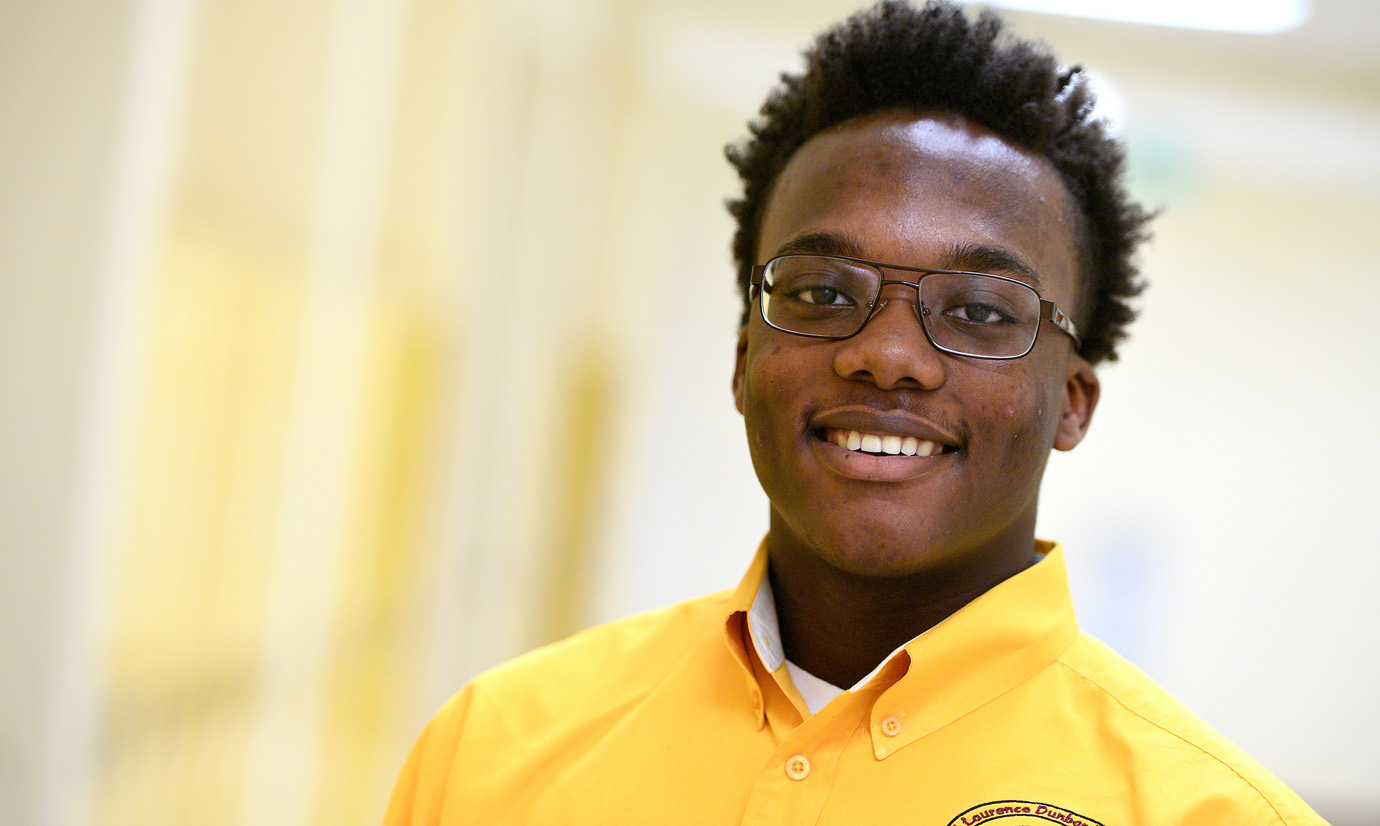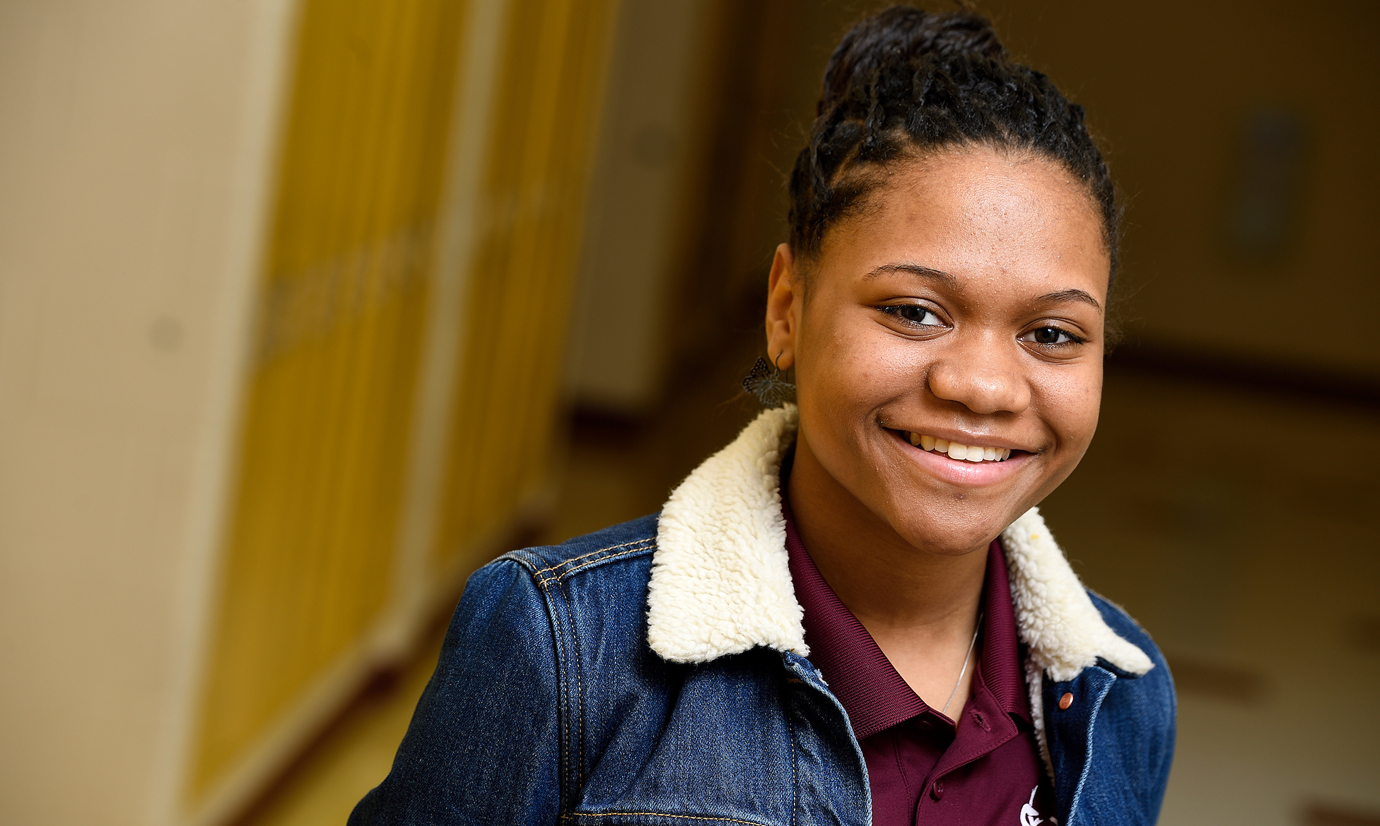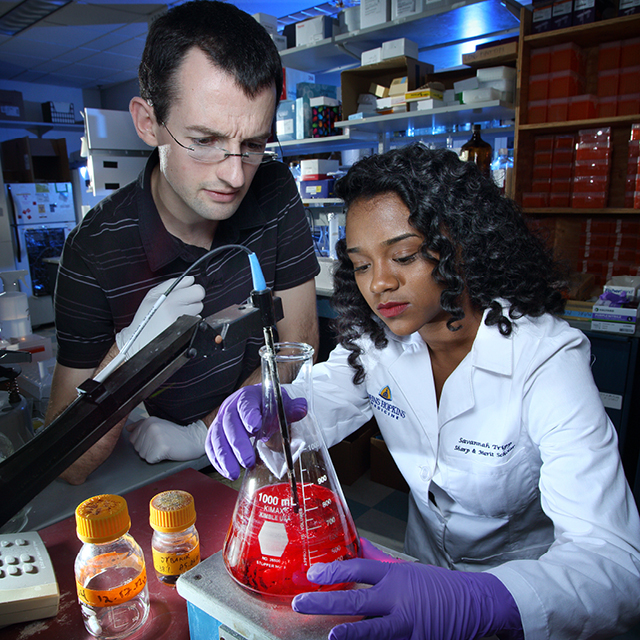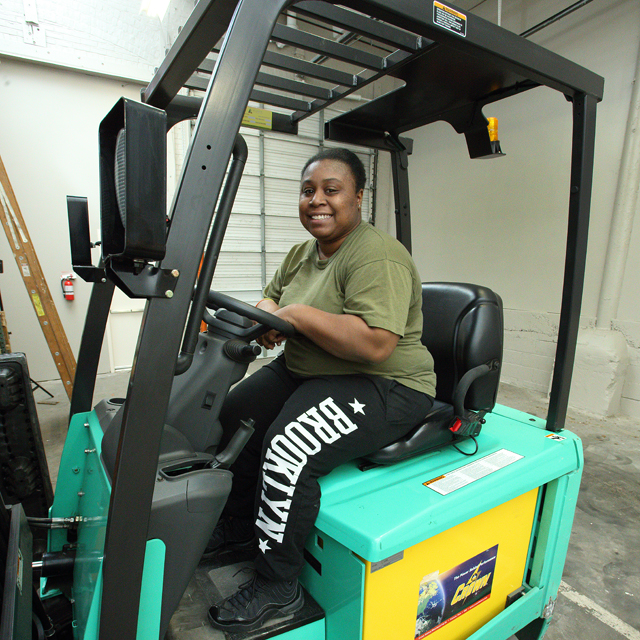Swimming laps in the pool at East Baltimore’s Paul Laurence Dunbar High School, Alvin Winn often thinks about how, exactly, his lungs function. “I’m on the swim team,” the 10th-grader explains. “It makes me think a lot about breathing and what happens when people have difficulty with it.”
At 15, he’s on a path toward a college degree and a job in respiratory services at The Johns Hopkins Hospital.
One of almost 100 Dunbar students enrolled in the school’s fledgling Pathways in Technology Early College High School (P-TECH) program, Alvin, like his classmates, is already working toward an associate’s degree in the health care field from Baltimore City Community College (BCCC).
“After that,” says Alvin, “I’m finishing college.”
The P-TECH program at Dunbar is designed to create clear pathways to both higher education and employment. Students in the program graduate from high school with a no-cost associate’s degree by augmenting their regular high school courses with community college classes.
Piloted in a New York City school in 2011, P-TECH provides a model for schools across the nation. High schools work with community colleges and corporate partners to craft a curriculum aimed at a specific set of skilled jobs identified by the corporate partner.
No particular test scores or academic records are required for admission into P-TECH. However, parents must commit to supporting program requirements by, for instance, making sure their kids keep up with their homework, get to school on time, and participate in weekend and summer P-TECH activities.
When Johns Hopkins University President Ronald J. Daniels toured the original P-TECH high school in Brooklyn in 2011, he imagined how the model might work in Baltimore. Daniels and leaders at Johns Hopkins Medicine identified four tracks for skilled, entry-level health care jobs that require training and a two-year college degree. Five years later, working closely with Maryland governor Larry Hogan, Johns Hopkins launched the state’s first P-TECH program at Dunbar High School.
Dunbar’s P-TECH students can select education tracks in health care information technology, nursing, physical therapy and respiratory services. Johns Hopkins provides one-on-one student mentors to offer school and career advice, as well as encouragement.
“Over the past two years, I have been thrilled with the resolute commitment we’ve seen from students, families and volunteers – all aimed at moving these young people more quickly toward higher education and good jobs,” says Daniels. “This is exactly what we envisioned when we started P-TECH.”
The first cohort of students is now in the 10th grade. Most have really taken to the work, says Craig Spilman, P-TECH corporate partner coordinator. Of the 50 Dunbar students who began P-TECH in 2016, 44 remain in the program. And, Spilman says, “90 percent of our mentors have stayed with us.”
Spilman says the majority of Dunbar’s P-TECH mentors are from Johns Hopkins, with the rest coming from the University of Maryland, Baltimore and Kaiser Permanente.
Isabel Molina, a medical concierge with Johns Hopkins Medicine International (JHI), mentors a 10th-grader in the Dunbar program’s physical therapy track. Molina believes she gets as much from the program as her mentee.
“He’s such a great kid,” she says. “I really admire his dedication. His motivation makes it really easy to be a mentor.”
Molina says she sees the student at regularly scheduled P-TECH events and has arranged for him to shadow a physical therapist at Johns Hopkins.
While the Johns Hopkins University School of Nursing and the hospital’s departments of physical therapy and respiratory services provide some of the program’s mentors, others come from parts of the university that aren’t explicitly represented in the P-TECH tracks, such as JHI and the Whiting School of Engineering.
“We’re looking for health care mentors who can encourage and help the students,” says Spilman. “They don’t have to be experts in a particular field.”

Between morning classes, an energetic bunch of freshman girls bursts into Alexia Smith’s office on Dunbar High School’s second floor, wearing their maroon-and-gold school colors and wide smiles. Among Smith’s duties as a liaison between Johns Hopkins Medicine and Dunbar is leadership of the P-TECH mentoring program. Smith knows the students and has formed bonds with many of them.
“We just came to say good morning,” one of the girls tells her.
The ninth-graders are enrolled in the school’s second P-TECH class. Smith says that for now, the transition from middle school to high school is more than enough to keep students like these girls challenged. Their college-level learning will begin this summer.
“They’ll take summer courses at Baltimore City Community College,” Smith explains. “It eases them into the academic side of the program. Then they’ll enroll in more college courses in the fall.”
The college journey has already begun for Dunbar’s P-TECH sophomores. Simone Wade rattles off a list of BCCC credits she’s racked up: “English 101, Math 101, computer literacy, sociology and psychology.”
While summer classes for P-TECH students are held on BCCC’s Liberty Heights Avenue campus, the college instructors come to Dunbar during the regular school year.
P-TECH programs in other states have shown that, though students have six years to complete the program, many finish with their graduating class. Afterward, students can continue their education at four-year universities or be first-in-line for employment with their P-TECH corporate partner.
Simone has chosen nursing for her P-TECH track but plans on taking her education further. She says the college courses are challenging — but nothing she can’t handle.
“Yeah, I want to go back to school after I graduate,” she says. “It’s tough, but it’s worth it.”



